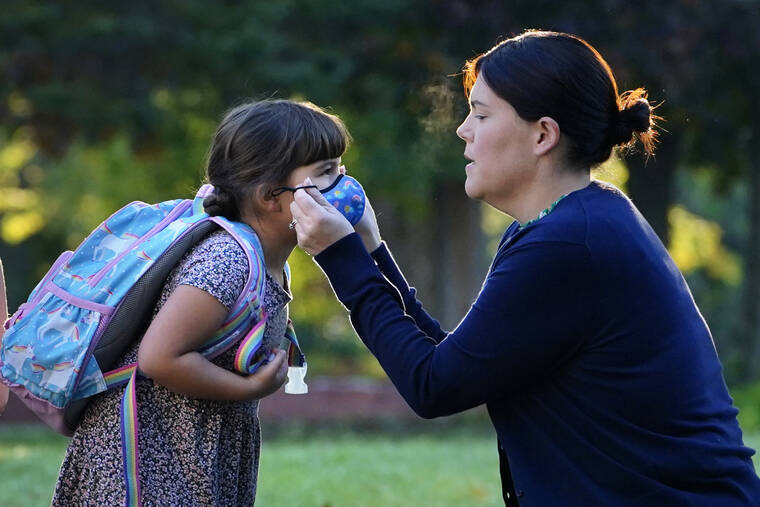Parents tired of worrying about classroom outbreaks and sick of telling their elementary school-age children no to sleepovers and family gatherings felt a wave of relief Thursday when Pfizer asked the U.S. government to authorize its COVID-19 vaccine for youngsters ages 5 to 11.
If regulators give the go-ahead, reduced-dose kids’ shots could begin within a matter of weeks.
That could bring many families a step closer to being done with remote learning, virus scares and repeated school shutdowns and quarantines.
“My son asked about playing sports. ‘After you’re vaccinated.’ He asked about seeing his cousins again. ‘After you’re vaccinated.’ A lot of our plans are on hold,” said Sarah Staffiere of Waterville, Maine, whose 7-year-old has a rare immune disease that has forced the family to be extra cautious throughout the pandemic.
“When he’s vaccinated, it would give our family our lives back,” she said.
Expanding vaccine availability to roughly 28 million more U.S. children is seen as another milestone in the fight against the virus and comes amid an alarming rise in serious infections in youngsters because of the extra-contagious delta variant.
It would also push the U.S. vaccination drive further ahead of much of the rest of the world at a time when many poor countries are desperately short of vaccine.
The Food and Drug Administration must decide whether the shots are safe and effective in younger children.
Many parents and pediatricians are clamoring for protection for youngsters under 12, the current age cutoff for COVID-19 vaccinations in the U.S.
Nine-year-old Audrey Moulder, who lives in the Philadelphia suburb of Drexel Hill, is looking forward to visiting her grandmother without worrying she will give the older woman COVID-19.
“She’s excited because she thinks it’s a responsibility,” said her father, Justin Moulder. “She wants to keep her friends safe and her family safe.”
Dr. Amanda Powell, an internist and pediatrician who runs a clinic in Portland, Maine, is eager to set up worry-free play dates and plan a family trip again once her 9-year-old son is vaccinated.
“We want to be able to resume some normal activities,” she said.
But there are also plenty of parents who are wary about getting the shot themselves and are in no hurry to have their children vaccinated.
Heather Miller, a mother of four from Dexter, Maine, said she wants to wait for follow-up studies on the vaccine. “I’m not 100% against getting it eventually, but I kind of fall into the ‘not right now, wait and see’ category,” she said.
Cindy Schilling, an elementary school principal in West Virginia, which ranks dead last in the percentage of fully vaccinated residents, said it has been a rough start to the year because so many children are testing positive or quarantining at different times, making it hard for teachers and students to stay on track.
Still, she said she often hears parents say they are more concerned about the effects of the vaccine than COVID-19.
“Some parents are all for it and getting it for peace of mind,” she said, “but the majority of parents I’ve talked to will not be getting it.”
While kids are at lower risk of severe illness or death than older people, COVID-19 does sometimes kill children — at least 520 so far in the U.S., according to the American Academy of Pediatrics.
Pfizer and its German partner BioNTech said their research shows younger children should get one-third of the dose now given to everyone else. After their second dose, the 5- to 11-year-olds developed virus-fighting antibody levels just as strong as those that teens and young adults get from regular-strength shots.
On Oct. 26, an independent expert panel that advises the FDA will publicly debate the evidence. If the FDA authorizes emergency use of the kid-size doses, the Centers for Disease Control and Prevention will make a final decision, after hearing from its outside advisers.
To avoid mix-ups, Pfizer is planning to ship the lower-dose vials specially marked for use in children.
It studied the lower dose in 2,268 volunteers ages 5 to 11 and said there were no serious side effects. The study isn’t large enough to detect any extremely rare side effects, such as the heart inflammation that sometimes occurs after the second dose of the regular-strength vaccine, mostly in young men.
Moderna has requested FDA permission to use its vaccine in 12- to 17-year-olds and also is studying its shots in elementary school children. Both Pfizer and Moderna are studying even younger children as well, down to 6-month-olds. Results are expected later in the year.
———
AP journalist Emma H. Tobin contributed to this report.
———
The Associated Press Health and Science Department receives support from the Howard Hughes Medical Institute’s Department of Science Education. The AP is solely responsible for all content.


